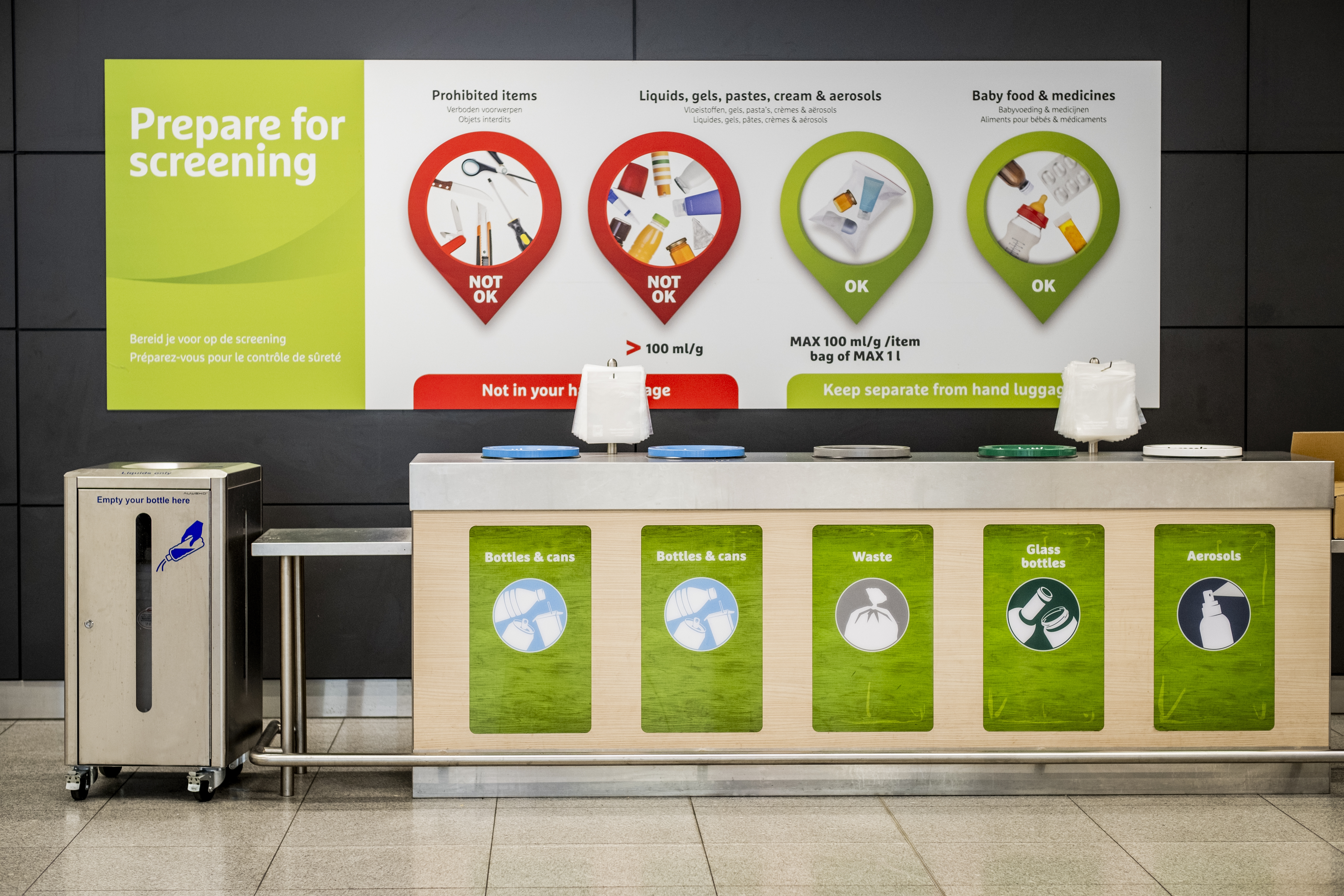Brussels Airport recycles bottles that are handed in at the security check
Installing new bins at the security gates has doubled PMD collection
Brussels Airport and Fost Plus have joined forces to improve waste sorting and recycling. To achieve this goal, a number of airport partners signed the Brussels Airport Waste Charter, undertaking to apply the principles of the circular economy and reduce waste at the airport.
The waste charter aims to apply the principles of a circular economy by deliberately opting for reusable and recyclable products and materials and sorting them correctly. All the signatory partners also undertake to increase awareness among their staff and passengers. The charter was initially signed in 2019 and has just been relaunched after the coronavirus crisis.
The ultimate goal is to increase the recycling rate for waste generated at the airport from four different flows (PMD, paper and cardboard, glass and organic waste) to at least 50% by 2025. The results are already very promising for 2023, as 27.9% of waste has been correctly sorted for recycling since January.
A practical approach on the ground
As part of the implementation of this charter, Fost Plus helped Brussels Airport Company to introduce sorting in its new offices, as regards setting up both the internal communication campaign and staff training courses. Sorting infrastructure assessments were also conducted to ensure that sorting runs smoothly in the offices. It is important to sort everywhere, not just within the airport.
Therefore, Fost Plus and Brussels Airport are assisting the airport’s partner companies to introduce or improve sorting. Based on an overview of the situation in the airport, they share their expertise and propose practical action plans. For some partners, this was done at the start of 2023.
Liquids bins a success
In the past, bottles that were not completely empty often ended up in the sorting bins before passengers went through security. So Brussels Airport saw this as a point in need of improvement and made a practical adjustment to ensure better waste management ahead of the security gates. Thanks to these facilities, the PMD collection rate reached 8.8% in 2022, twice that of 2021 (4.2%).
“Liquids bins” have been placed in front of the speed gates so that passengers can empty their bottles before throwing them in the blue containers, with clear indications about where the waste should go.
This has several advantages:
- A solution to empty bottles, whether they can be reused or not
- Improved waste sorting
- Even if consumers sort them properly, full or half-full bottles cannot be recycled because they cannot be correctly sorted in the sorting centres. Once they have been properly emptied, the recycling chain can continue as planned.
Following the success of the first four bins, another six have been ordered to boost the project. The airport's bins are constantly assessed in terms of position, width, etc. to ensure optimal sorting in the airport.

This charter is part of the Stargate programme launched in 2021. It is to be run by Brussels Airport for five years as part of one of three airport Green Deal projects that aim mainly to make the European airport and aviation industry more environmentally friendly more quickly. Stargate is intended to inspire and transform the sector and serve as a test bench for other EU countries. The liquids bins installed in Brussels are one of the best examples to be followed by other European airports.
Working with Fost Plus brings added value to this project. Their expertise and their experience in matters like sorting, best collection practices and increasing awareness are very valuable to us. We really can rely on their general support to achieve our goals
We are proud to collaborate with Brussels Airport on this project. Airports are still a major source of unsorted waste. Foreign travellers often don’t know much about the Belgian sorting rules. So we are delighted to see that simple steps, such as liquids bins, have led to a twofold increase in the recovery of PMD waste. This is a great development and we will continue to support Brussels Airport along these lines
